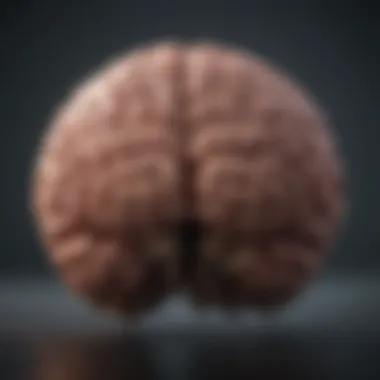Unlock the Secrets of Your Mind: A Comprehensive Analysis of Mental Age Assessment


News Updtaes
As we embark on this intellectual journey to delve into the depths of cognitive assessment and mental age, it is essential to understand the nuances and complexities that underpin this intriguing subject. From the latest cognitive research breakthroughs to the exploration of how mental age varies from one's chronological age, each aspect provides a unique perspective on cognition and behavior. Stay tuned for updates on groundbreaking studies, new assessment tools, and the evolving landscape of mental age evaluation across different demographics and regions. Through dissecting the latest findings and trends in cognitive assessment, we aim to broaden our understanding of how our minds work and adapt to various stimuli. Keep abreast of the cutting-edge developments in the field of cognitive science and unravel the mysteries surrounding mental age and its implications.
Reviews and Recommnedations
In the realm of mental age exploration, where nuances and subtleties matter greatly, detailed reviews and thoughtful recommendations play a vital role. Discover a treasure trove of insightful analyses on popular cognitive assessment tools, methodologies, and emerging approaches reshaping the landscape of mental age evaluation. Uncover the nuances of different assessment models, from traditional to innovative techniques, and gain a deeper understanding of their applications in different contexts. Explore the top picks in mental age assessment resources, garnering insights into their strengths, weaknesses, and overall utility in evaluating cognitive performance. Find comprehensive ratings, pros, and cons of various assessment instruments, enabling you to make informed decisions based on quality and relevance. Dive into the world of cognitive assessment reviews and let reputable voices guide you in your exploration of mental age and cognitive profiling.
Tips and Tricds
Navigating the intricacies of cognitive assessment and mental age estimation can be a daunting task without practical tips and strategies to steer you in the right direction. Unveil gaming strategies, hacks, and walkthroughs tailored to enhancing cognitive abilities and honing your assessment skills. Delve into tech tips aimed at optimizing devices and gadgets utilized in cognitive assessment practices, ensuring seamless functionality and accurate results. Find a plethora of movie and TV show recommendations aligned with cognitive themes and psychological profiling, elevating your viewing experience and stimulating intellectual curiosity. Immerse yourself in a realm of practical insights and expert guidance in navigating the twists and turns of mental age evaluation and cognitive profiling.
Tindring Topics
Amidst the ever-evolving landscape of cognitive assessment and mental age exploration, staying abreast of trending topics and emerging phenomena is paramount. Engage with current trends and social media buzz revolving around cognitive assessment methodologies, innovations, and breakthroughs reshaping the industry. Dive into analyses of viral content, memes, and internet discussions related to mental age, cognition, and behavioral assessments, uncovering insightful perspectives and thought-provoking debates. Explore controversial issues, debates, and fandoms within the realm of cognitive assessment, shedding light on diverse opinions and creating a forum for intellectual discourse. Immerse yourself in the dynamic world of mental age exploration and cognitive assessment trends, where every discussion opens doors to new insights and discoveries.
Introduction to Mental Age
Defining Mental Age
In the quest to define Mental Age, we are presented with a journey through its historical context and modern interpretations, showcasing the evolution of this concept over time.
Historical Context
Entering the realm of historical context provides us with invaluable insight into the roots of mental age assessment. By analyzing the historical foundations, we can unearth the intellectual milestones that have sculpted the understanding of cognitive evaluation. Despite the complexities that historical perspectives may introduce, they offer a foundation to bridge past knowledge with contemporary practices, highlighting the continuity and progression within the field of mental age assessment.
Modern Interpretation
Shifting towards modern interpretations unveils the current landscape of mental age assessment methodologies. Diving into modern perspectives allows us to assess the relevance of contemporary approaches in understanding cognitive capabilities. By embracing modern interpretations, we can leverage advanced techniques and technologies to enhance the accuracy and efficiency of mental age evaluations, steering towards a more comprehensive understanding of cognitive development. While modern interpretation brings innovative methodologies to the forefront, it also raises critical considerations regarding the integration of cutting-edge practices within traditional frameworks.
Importance of Mental Age
The significance of Mental Age lies at the core of cognitive assessment paradigms, illuminating its pivotal role in discerning cognitive abilities and behavioral patterns.
Relevance in Psychology
Within the realm of psychology, Mental Age serves as a fundamental metric to gauge cognitive functions and intellectual prowess. By elucidating the relevance of Mental Age in psychological assessments, we can appreciate its implications in diagnosing cognitive impairments and delineating individual cognitive strengths. Understanding the significance of Mental Age in psychological frameworks enables us to grasp the complexities of cognitive processes and tailor interventions effectively, marking it as a cornerstone in psychological evaluations.
Impact on Individual Development
Delving into the impact of Mental Age on individual development unveils the profound implications it holds in shaping cognitive trajectories. By scrutinizing the influence of Mental Age on personal growth and cognitive maturation, we can dissect the intricate interplay between cogniitional advancements. The paradigm of Impact on Individual Development serves as a cornerstone in crafting personalized learning strategies, harnessing cognitive potentials, and fostering holistic developmental outcomes.
Factors Influencing Mental Age
Exploring the multifaceted terrain of Factors Influencing Mental Age sheds light on the intricate amalgamation of genetic determinants and environmental influences.
Genetic Determinants


Amidst the labyrinth of cognitive assessment, Genetic Determinants emerge as key players in delineating mental age variations. By dissecting the genetic underpinnings of cognitive development, we can discern the hereditary factors that shape cognitive aptitudes and navigate the intricate landscape of genetic influences on mental age determinations. Integrating genetic determinants in mental age assessments not only enriches the diagnostic accuracy but also underscores the interplay between nature and nurture in cognitive development trajectories.
Environmental Influences
Venturing into the realm of environmental influences unveils the nuanced tapestry of external factors that mold mental age assessments. By scrutinizing the impact of environmental stimuli on cognitive growth, we can decipher the intricate threads that intertwine social, cultural, and educational inputs with cognitive maturation. Environmental influences in mental age assessments offer a holistic perspective on cognitive development, emphasizing the dynamic interaction between individuals and their surroundings in shaping cognitive outcomes.
Cognitive Assessment Techniques
Cognitive Assessment Techniques play a pivotal role in our exploration of mental age, providing a structured approach to evaluating cognitive functioning. These techniques encompass a range of tools and methods designed to assess various facets of cognition. By utilizing Cognitive Assessment Techniques, we can gain valuable insights into an individual's cognitive strengths and weaknesses, aiding in the determination of their mental age. Understanding the importance of Cognitive Assessment Techniques is paramount in unraveling the complexities of cognitive assessment and its implications for overall cognitive development.
IQ Tests
Types of IQ Tests
When delving into the realm of IQ tests, it is essential to grasp the different types available, each catering to distinct aspects of cognitive abilities. Types of IQ tests such as Stanford-Binet and Wechsler Intelligence Scales serve as insightful measures of intellectual capacity, offering a comprehensive evaluation of cognitive aptitudes. Their structured format and standardized scoring systems make them a valuable choice for assessing cognitive abilities across diverse populations. Despite some drawbacks in terms of cultural bias, these IQ tests remain widely utilized in cognitive assessment, contributing significantly to our understanding of mental age disparities.
Validity and Reliability
Validity and reliability are critical components in the realm of IQ tests, ensuring the accuracy and consistency of results. Establishing the validity of an IQ test involves assessing whether it truly measures what it intends to measure, while reliability focuses on the test's consistency in producing the same results under similar conditions. The high validity and reliability of standardized IQ tests make them a dependable choice for evaluating cognitive abilities and determining mental age differentials. However, factors such as test-taking environment and individual motivation can impact the validity and reliability of IQ test results, necessitating a thorough consideration of these aspects in cognitive assessment.
Neuropsychological Assessments
Purpose and Methodology
Neuropsychological assessments offer a comprehensive evaluation of cognitive functioning through the analysis of brain-behavior relationships. The purpose of these assessments is to identify cognitive strengths and deficits by examining various cognitive domains such as memory, attention, and executive functions. By utilizing specialized tasks and performance measures, neuropsychological assessments provide valuable insights into an individual's cognitive profile, shedding light on potential mental age incongruities. The methodology involved in neuropsychological assessments emphasizes the systematic evaluation of cognitive functions, allowing for a detailed analysis of cognitive processes and potential impairments.
Clinical Applications
The clinical applications of neuropsychological assessments extend to diagnosing cognitive disorders, guiding treatment interventions, and monitoring cognitive changes over time. These assessments are instrumental in assessing cognitive functioning in individuals with neurological conditions such as traumatic brain injury, dementia, and stroke. By employing standardized neuropsychological measures, clinicians can accurately assess cognitive abilities and track cognitive performance, contributing to our understanding of mental age variations. However, challenges related to interrater reliability and test interpretation highlight the importance of rigorous training and expertise in conducting neuropsychological assessments.
Behavioral Observation
Behavioral Patterns
Behavioral observation plays a key role in cognitive assessment, focusing on the analysis of an individual's behavior in various contexts. By observing behavioral patterns such as social interactions, problem-solving approaches, and emotional responses, assessors can gain valuable insights into cognitive functioning and emotional regulation. These behavioral patterns provide a window into an individual's cognitive processes and adaptive behaviors, aiding in the assessment of mental age differentials. Moreover, behavioral patterns offer valuable cues for designing tailored interventions and support strategies based on individual cognitive needs.
Interpretation
Interpreting behavioral observations requires a nuanced understanding of human behavior and cognitive functioning. By analyzing behavioral responses in cognitive tasks and everyday situations, assessors can decipher underlying cognitive processes and emotional responses. The interpretation of behavioral observations in cognitive assessment enables assessors to draw parallels between observed behaviors and cognitive functioning, facilitating a comprehensive evaluation of an individual's mental age. However, challenges related to subjective interpretation and observational biases necessitate a structured approach to behavioral analysis, emphasizing the importance of incorporating multiple sources of data in cognitive assessment.
Understanding Mental Age Discrepancies
Understanding Mental Age Discrepancies holds a paramount position in this enlightening expedition into cognitive assessment. It underlines the essence of discerning how one's cognitive development may unfold distinctively from the expectations based on chronological age. By exploring the nuances of mental age differences, we unravel the intricate interplay between genetic predispositions and environmental influences that shape an individual's cognitive abilities. This section serves as a cornerstone in appreciating the critical insights provided by assessing mental age and its implications on overall cognitive functioning.
Cognitive Development
Nature vs. Nurture Debate
Delving into the Nature vs. Nurture Debate within the realm of Cognitive Development offers a captivating exploration of the origins of cognitive abilities. This debate examines the extent to which genetics (nature) and environmental factors (nurture) influence the development of cognitive processes. By dissecting the implications of this fundamental debate, we gain a deeper understanding of how both hereditary traits and external influences interact to mold one's cognitive capabilities. The ongoing discourse surrounding the Nature vs. Nurture Debate enriches our comprehension of the multifaceted aspects that contribute to cognitive development.


Critical Periods
The discussion of Critical Periods within Cognitive Development sheds light on the notion that there are specific stages in life where certain skills and abilities must be acquired for optimal development. Identifying and understanding these critical periods enhances our awareness of the time-sensitive nature of cognitive growth. By elucidating the importance of seizing opportunities for learning and skill acquisition during these critical phases, we highlight the significance of early intervention and targeted cognitive stimulation. Critical Periods serve as pivotal milestones in the narrative of cognitive maturation, emphasizing the urgency of nurturing cognitive skills at crucial junctures.
Emotional Intelligence
Empathy and Social Skills
Exploring the realms of Empathy and Social Skills unveils the integral role emotions play in cognitive functioning. This facet focuses on the capacity to understand and navigate interpersonal dynamics, accentuating the value of emotional acuity in shaping cognitive responses. By delving into the complexities of empathy and social adeptness, we appreciate how these emotional competencies intertwine with cognitive processes to influence behavior and decision-making. Nurturing empathy and social skills emerges as a foundational element in enhancing overall emotional intelligence and cognitive dexterity.
Emotion Regulation
The exploration of Emotion Regulation delves into the adaptive mechanisms individuals employ to manage and modulate their emotional experiences. This facet emphasizes the cognitive processes involved in regulating one's emotions effectively, showcasing how self-regulation impacts cognitive performance and interpersonal interactions. By unraveling the intricacies of emotion regulation, we uncover the intricate dance between emotional responses and cognitive control mechanisms. Harnessing the power of emotion regulation unveils a dynamic interplay between emotional intelligence and cognitive resilience, bolstering individual well-being and cognitive adaptability.
Adaptability and Learning
Flexible Thinking
Immersing in the realm of Flexible Thinking accentuates the significance of cognitive flexibility in navigating complex challenges and evolving environments. Flexible thinking denotes the ability to adapt cognitive strategies and perspectives in response to changing circumstances, highlighting the adaptive nature of cognitive processes. By embracing the fluidity of flexible thinking, individuals enhance their problem-solving skills and cognitive agility, fostering a proactive approach to diverse cognitive tasks. The pursuit of flexible thinking underscores the importance of embracing variability in cognitive approaches, fostering innovation and creativity in cognitive endeavors.
Learning Styles
The exploration of Learning Styles illuminates the diverse modalities through which individuals comprehend and retain information. This facet underscores the personalized nature of learning preferences and the impact of individual learning styles on cognitive outcomes. By honing in on distinct learning modalities, we optimize educational strategies to cater to varied cognitive styles, promoting enhanced knowledge retention and comprehension. Understanding the intricacies of learning styles empowers individuals to leverage their cognitive preferences effectively, fostering a synergistic relationship between personalized learning approaches and cognitive proficiency.
Practical Applications of Mental Age
In this section of our in-depth exploration of cognitive assessment, we turn our attention to the practical applications of understanding mental age. By unraveling the significance of mental age in various real-world contexts, we shed light on how this concept can inform decision-making processes and foster individual growth. Understanding mental age allows us to tailor educational approaches, career trajectories, and personal development strategies to better suit the cognitive needs of individuals. This comprehensive guide aims to highlight key points surrounding the practical applications of mental age and its relevance to cognitive assessment.
Educational Settings
Special Education Programs
Exploring the realm of special education programs within the framework of mental age assessment provides a nuanced understanding of how tailored educational interventions can support individuals with diverse cognitive profiles. These programs offer personalized academic strategies designed to address specific learning challenges and optimize cognitive development. A key characteristic of special education programs lies in their ability to individualize learning experiences, catering to unique cognitive needs and fostering holistic growth. The unique feature of special education programs is their adaptive approach, which acknowledges the diverse ways individuals learn and excel. While they provide personalized support, challenges may arise in ensuring equitable access and resource distribution within such programs.
Individualized Learning Plans
Delving into individualized learning plans reveals a targeted approach to enhancing cognitive skills and knowledge acquisition. These plans are crafted to accommodate the distinctive learning pace and style of each individual, thereby optimizing the learning experience. The key characteristic of individualized learning plans is their tailored nature, which tailors educational content and methods to align with personal cognitive strengths and areas for improvement. This customization ensures that individuals receive the necessary support to reach their full cognitive potential. An advantage of individualized learning plans is their ability to address specific learning gaps effectively. However, striking a balance between personalized curricula and standardized educational requirements can pose a challenge in implementing these plans effectively.
Career Guidance
Matching Skills and Roles
Within the realm of career guidance, the concept of matching skills and roles based on mental age assessment underscores the importance of aligning individuals with occupations that complement their cognitive abilities. This matching process involves evaluating an individual's skill set, cognitive aptitudes, and career aspirations to direct them towards suitable professional paths. The key characteristic of matching skills and roles is its ability to optimize occupational satisfaction and performance by leveraging cognitive strengths. This personalized approach not only benefits individuals in finding fulfilling roles but also aids organizations in maximizing employee potential. The unique feature of this matching process lies in its adaptability, allowing for career transitions and skill development based on evolving cognitive assessments. While advantageous, potential challenges may arise in accurately gauging long-term skill compatibility.
Professional Development
Examining the realm of professional development through the lens of mental age assessment emphasizes the significance of continuous skill enhancement and career progression. Professional development initiatives aim to equip individuals with the necessary tools and skills to excel in their respective fields. The key characteristic of professional development is its focus on ongoing learning and skill refinement, aligning with cognitive growth trajectories. This continuous improvement approach ensures that individuals remain competitive and adaptable in dynamic work environments. A unique feature of professional development is its emphasis on tailored training programs that cater to individual cognitive needs and career goals. While advantageous in fostering career advancement, limitations may arise in balancing professional development with job responsibilities effectively.
Personal Growth Strategies


Mindfulness Practices
Exploring mindfulness practices in the context of mental age assessment reveals an insightful approach to promoting emotional well-being and cognitive resilience. These practices encourage individuals to cultivate present-moment awareness, manage stress effectively, and enhance cognitive flexibility. The key characteristic of mindfulness practices is their focus on cognitive regulation and emotional intelligence, fostering a harmonious balance between mind and body. Choosing mindfulness practices over traditional coping mechanisms can offer numerous benefits, including improved focus, reduced anxiety levels, and enhanced cognitive clarity. However, challenges may arise in maintaining consistent mindfulness routines amidst busy schedules and competing priorities.
Continuous Learning
Unveiling the concept of continuous learning as a personal growth strategy within mental age assessment showcases the enduring value of expanding cognitive horizons and acquiring new skills. Continuous learning emphasizes the importance of intellectual curiosity, adaptive thinking, and knowledge accumulation throughout one's lifespan. The key characteristic of continuous learning is its emphasis on ongoing skill acquisition and cognitive development, promoting agile problem-solving abilities and cognitive resilience. Engaging in continuous learning endeavors offers individuals the opportunity to stay abreast of industry trends, foster innovation, and enhance cognitive adaptability. The unique feature of continuous learning lies in its capacity to enable individuals to navigate cognitive challenges and embrace lifelong learning journeys. While advantageous in promoting personal growth, potential obstacles may include time constraints and access to diverse learning resources.
This detailed exploration underscores the multifaceted applications of mental age assessment in educational, career, and personal development arenas, highlighting the intricate interplay between cognitive assessment and practical outcomes.
Challenges in Mental Age Assessment
In this article, we dive deep into the crucial aspect of Challenges in Mental Age Assessment, shedding light on the intricate processes and considerations that come into play when evaluating mental age. Understanding and addressing Challenges in Mental Age Assessment is paramount to gaining a comprehensive insight into an individual's cognitive capabilities, going beyond the surface and delving into the complexities that influence cognitive development. By exploring the specific elements and nuances within Challenges in Mental Age Assessment, we aim to provide a detailed account of the significance of this topic in unraveling the mysteries of human cognition and behavior.
Cultural Factors
- Cultural Bias in Testing
Cultural Bias in Testing
The notion of Cultural Bias in Testing holds a prominent position within the realm of Challenges in Mental Age Assessment. It emphasizes the impact of cultural backgrounds on assessment outcomes, underscoring the need for a nuanced understanding of how cultural factors can skew test results. By recognizing the key characteristic of Cultural Bias in Testing and its implications, we can better grasp the complexities surrounding mental age evaluations and tailor assessments to encompass diverse cultural perspectives. This unique feature of Cultural Bias in Testing contributes significantly to our quest for accurate and unbiased cognitive assessments, although it also presents challenges that demand careful consideration in this article.
- Cross-Cultural Perspectives
Cross-Cultural Perspectives
Another pivotal aspect intertwined with Challenges in Mental Age Assessment is the lens of Cross-Cultural Perspectives. This perspective amplifies the importance of embracing varied cultural viewpoints in assessing mental age, enriching the assessment process with cultural diversity and sensitivity. By highlighting the key characteristic of Cross-Cultural Perspectives and its role in enriching our understanding of mental age, we pave the way for a more inclusive and culturally informed approach to cognitive evaluations. Exploring the unique feature of Cross-Cultural Perspectives unveils new opportunities for refining assessment practices and deepening our insights into the multifaceted nature of human cognition within the context of diverse cultural landscapes.
Ethical Considerations
- Informed Consent
Informed Consent
Delving into the ethical considerations surrounding mental age assessments, the concept of Informed Consent emerges as a critical cornerstone. It emphasizes the necessity of transparency and autonomy in cognitive evaluations, ensuring that individuals have a comprehensive understanding of the assessment process and the implications of the results. Highlighting the key characteristic of Informed Consent and its significance in upholding ethical standards, we illuminate the importance of respecting individuals' rights and choices within the realm of mental age assessments. By describing the unique features of Informed Consent and its ethical considerations, we uphold the values of integrity and respect in this article, safeguarding the well-being and dignity of those undergoing cognitive evaluations.
- Confidentiality
Confidentiality
Similarly, the principle of Confidentiality plays a pivotal role in guiding ethical considerations within mental age assessments. It underscores the confidentiality and privacy of assessment outcomes, safeguarding individuals' sensitive information and maintaining the trust between assessors and participants. By highlighting the key characteristic of Confidentiality and its significance in upholding professional ethics, we underscore the importance of maintaining data security and confidentiality in cognitive assessments. Exploring the unique features of Confidentiality unveils the ethical considerations that shape our approach to mental age evaluations, emphasizing the need for discretion and integrity in handling sensitive cognitive data.
Limitations of Traditional Assessments
- Incomplete Picture
Incomplete Picture
Addressing the Limitations of Traditional Assessments, the concept of an Incomplete Picture comes to the forefront as a key consideration. It underscores the inherent limitations of traditional assessment tools in capturing the full spectrum of cognitive abilities, highlighting gaps and blind spots in the assessment process. By exploring the key characteristic of an Incomplete Picture and its implications, we acknowledge the constraints of conventional assessment methods in providing a holistic view of mental age. Describing the unique feature of an Incomplete Picture and its limitations in this article, we underscore the importance of complementing traditional assessments with advanced techniques to paint a more comprehensive and accurate picture of an individual's cognitive profile.
- Dynamic Nature of Cognition
Dynamic Nature of Cognition
Furthermore, the Dynamic Nature of Cognition emerges as an essential aspect within the landscape of Limitations of Traditional Assessments. It accentuates the ever-evolving nature of cognitive abilities and the need for assessments to adapt to these dynamic changes over time. By highlighting the key characteristic of the Dynamic Nature of Cognition and its implications for assessment practices, we underscore the importance of dynamic and responsive evaluation frameworks that can capture fluctuations in mental age accurately. Exploring the unique feature of the Dynamic Nature of Cognition and its implications, we shed light on the challenges and opportunities presented by the evolving nature of cognition, shaping our approach to mental age assessments in this article.







